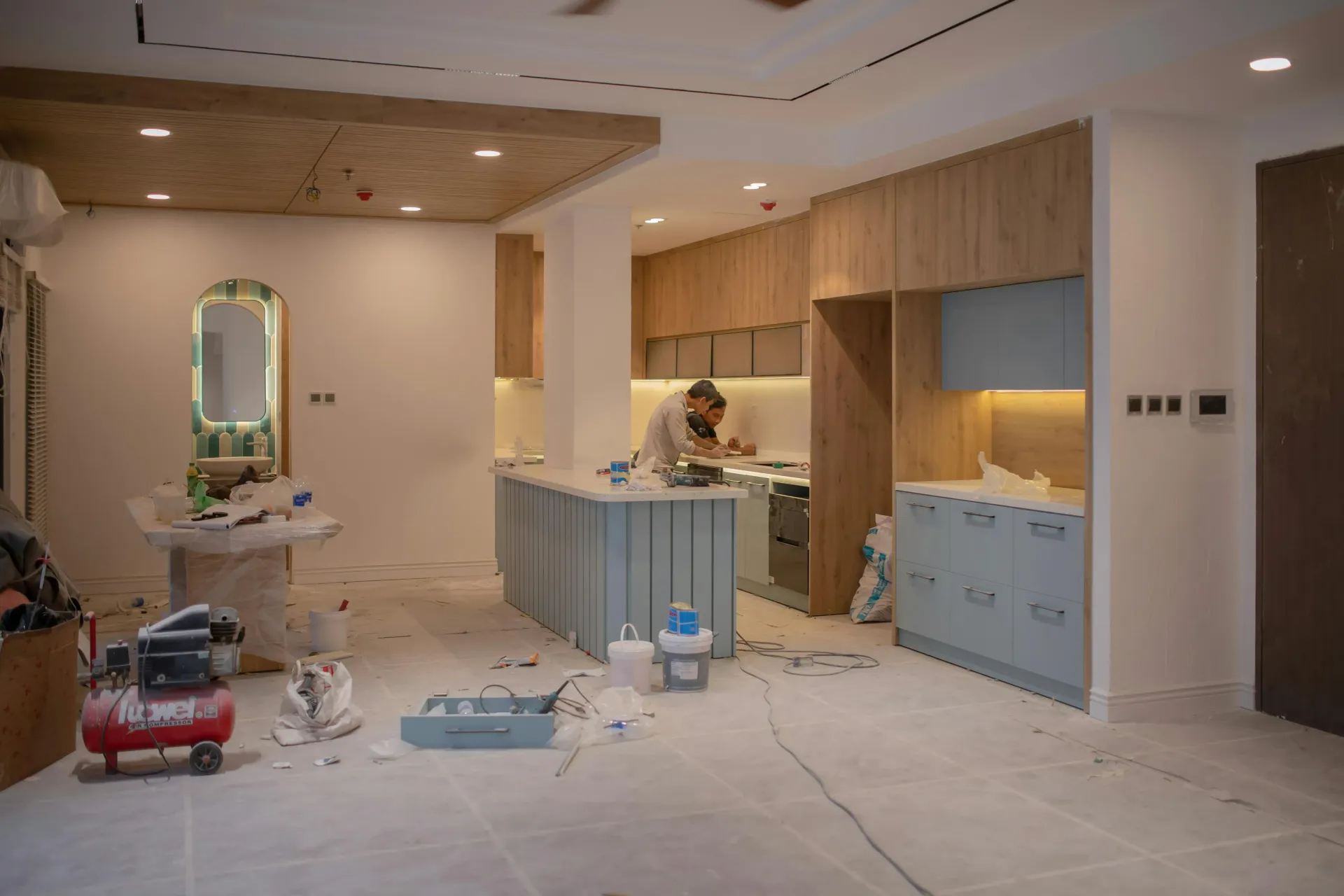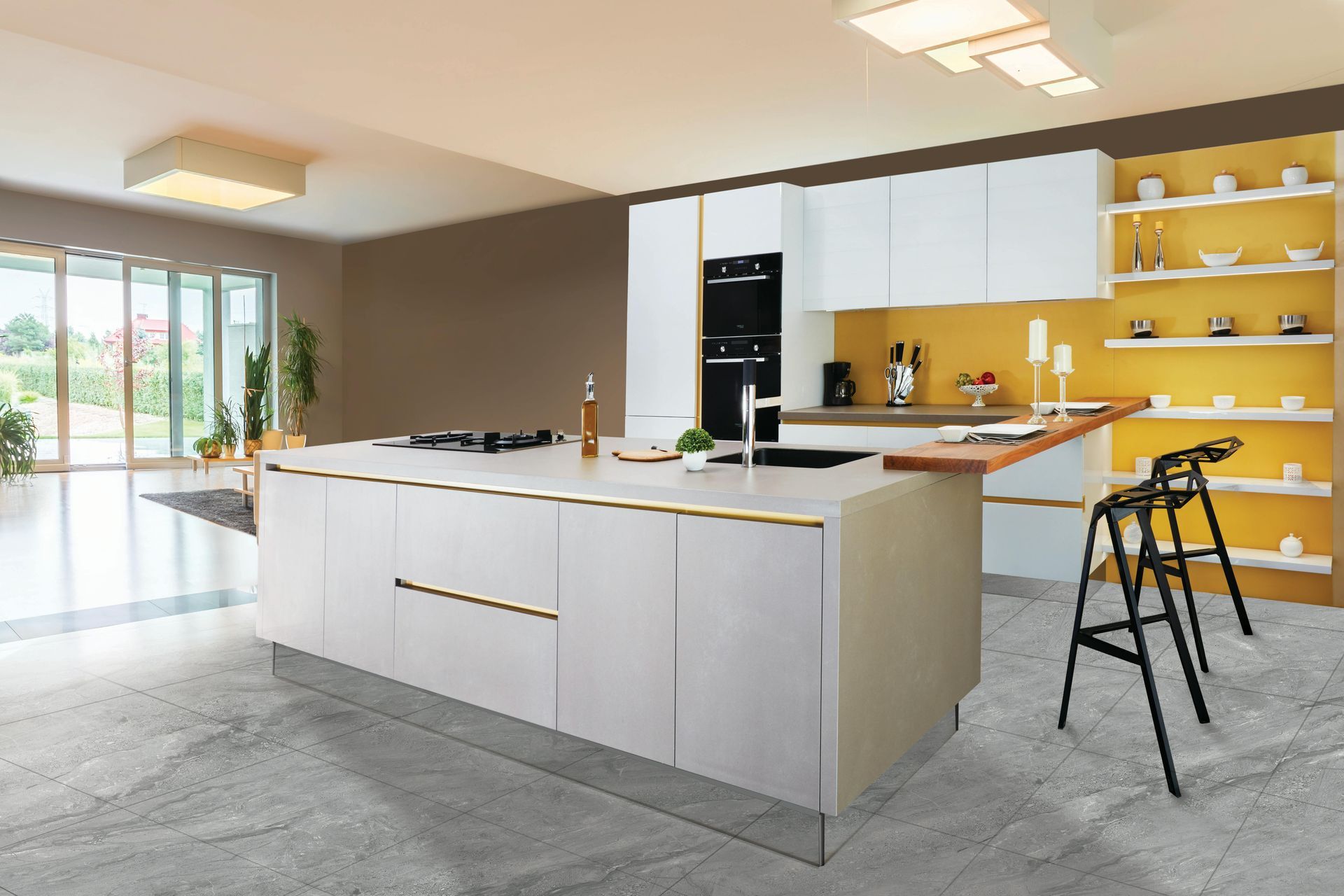How Long Does It Take to Remodel a Kitchen? A Complete Guide

How Long Does It Take to Remodel a Kitchen? Discover Your Kitchen Remodel Timeline!
Curious about how long a kitchen remodel usually takes? The timeline can vary depending on the extent of the renovation. Whether you’re making minor changes or transforming the entire space, knowing how long it might take helps you stay prepared. Here's a breakdown of what you can expect.
How Long Does a Kitchen Remodel Typically Take?
A typical kitchen remodel takes anywhere from 6 to 12 weeks. The exact timeline depends on the size of your kitchen, the materials you choose, and how extensive the changes are. If you’re going for a basic update, like swapping out countertops or appliances, it might take less time. On the other hand, a full kitchen renovation, especially one with structural changes, can extend the timeline.
Keep in mind that unexpected delays, like waiting for materials or dealing with hidden issues, can add a bit more time to your project. Planning with some flexibility ensures a smoother process.
Factors Influencing Kitchen Remodeling Time
1. Size of the Kitchen
Larger kitchens require more time due to the increased work and materials involved.
2. Scope of Work
A simple update takes less time than a full-scale renovation. The more extensive the project, the longer it will take.
3. Material Availability
Custom or back-ordered materials can cause delays. Opting for readily available options can speed up the process.
4. Contractor Schedules
Contractors juggling multiple projects can impact how fast they finish your remodel.
5. Permits and Inspections
Structural changes often require permits and inspections, which may add time to the project.
Knowing these factors helps manage your expectations and plan your timeline better.
Average Time Frame for a Kitchen Remodel
On average, most kitchen remodels take about 6 to 12 weeks. This timeline covers everything from the initial demolition to the final installation of cabinets, countertops, and appliances. Smaller, less complex projects can wrap up in as little as 3 to 4 weeks, while larger renovations involving structural changes can stretch out to 3 or more months.
Here’s a quick breakdown:
Minor remodels: 3 to 6 weeks
Standard remodels: 6 to 12 weeks
Major remodels with structural changes: 3 to 6 months
The more detailed and customized the project, the longer it tends to take.
Why Some Kitchen Projects Take Even Longer
Some kitchen remodels go beyond the typical timeline, often for reasons that are hard to control. Here are a few factors that can cause delays:
1. Custom Designs and Materials
Custom cabinets, countertops, or unique fixtures can take longer to fabricate and install. If you're opting for one-of-a-kind designs, expect a longer wait.
2. Unforeseen Structural Issues
During demolition, hidden problems like outdated wiring, plumbing issues, or structural damage can surface. Fixing these can push back your schedule.
3. Permits and Inspections
Some municipalities have long wait times for building permits or require multiple inspections throughout the remodel. These steps are necessary but can slow things down.
4. Contractor Availability
If your contractor or key tradespeople have other jobs lined up or face unexpected delays, your project could be put on hold.
Planning for some of these potential delays can help minimize frustration and keep your remodel on track as much as possible.
What Steps Are Involved in a Kitchen Renovation?
A kitchen renovation is more than just installing new cabinets and countertops. It involves several key steps, each crucial to the project's success:
The Importance of the Design Phase in Remodeling
The design phase is the foundation of any successful kitchen remodel. It’s where you make all the key decisions, from layout to materials. A well-thought-out design helps prevent costly changes down the road. This step can take anywhere from a few days to several weeks, depending on how detailed your plans are and how quickly decisions are made.
Understanding Demolition and Its Impact on Timing
Demolition is one of the fastest phases in a kitchen remodel but also one that can uncover surprises. If walls are being knocked down or old cabinets torn out, it could reveal hidden issues like plumbing or electrical problems. This phase typically lasts 1 to 5 days, but unexpected findings can extend it.
Installation of Cabinets, Countertops, and Appliances
Once the demolition is complete, installation begins. Cabinets usually go in first, followed by countertops and appliances. This phase can take a couple of weeks, depending on the complexity of the installation and the availability of materials. Custom cabinets or countertops might stretch this phase out even further. After installation, final touches like backsplash, lighting, and hardware are added.
How to Plan Your Kitchen Remodel Timeline Efficiently?
Planning is key to keeping your kitchen remodel on track. Here are some tips for making sure everything runs smoothly and stays within your expected timeline:
Creating a Realistic Kitchen Remodeling Project Plan
Set a timeline that’s achievable. Make room for potential delays and avoid rushing the process. Break down each phase, from design to installation, and assign time frames to each. Being realistic about how long each task will take helps prevent frustration later.
Managing Delays and Adjustments During the Remodel
Delays happen, so be prepared. Whether it's materials arriving late or unforeseen structural issues, it's important to have a backup plan. Keep communication open with your contractor so you can quickly adjust when unexpected problems arise.
Working with Contractors and Home Remodeling Programs
Collaborating with experienced contractors is essential for staying on schedule. They can also help you navigate remodeling programs that offer project management tools, keeping everything organized and on track. Clear communication and frequent check-ins with your contractor ensure things move forward efficiently.
Does the Scope of the Project Affect the Time to Complete?
Yes, the scope of your kitchen remodel has a huge impact on how long it will take. Here’s how different aspects of the project can influence the timeline:
Difference Between a Standard and a Custom Kitchen Renovation
A standard renovation with pre-made cabinets and off-the-shelf materials generally takes less time. Custom renovations, on the other hand, involve made-to-order designs, custom cabinetry, and unique finishes. This can add weeks, or even months, to the project.
How Structural Changes Impact Your Kitchen Remodel
If your remodel involves knocking down walls, relocating plumbing or electrical lines, or adding windows, expect the timeline to extend. Structural changes often require permits and inspections, which can introduce delays. Additionally, they involve more complex work, like rerouting systems, which adds to the duration.
Considering the Entire Kitchen vs. Partial Updates
A full kitchen remodel naturally takes longer than just updating a few elements. If you're replacing everything from floors to countertops, you’ll need more time for planning, demolition, and installation. In contrast, a partial update—like upgrading only the countertops or cabinets—can be completed much faster.
How Can You Remodel Your Kitchen Without Disruption?
Remodeling your kitchen doesn’t mean you have to disrupt your daily life entirely. With some smart planning, you can keep things running smoothly while the work is underway.
Making the Best Use of Your Kitchen During the Remodel
During a remodel, it’s essential to set up a temporary kitchen space. Use another part of the house for basic meal prep by keeping a microwave, coffee maker, and mini-fridge handy. This allows you to maintain some normalcy while your kitchen is being transformed.
Temporary Solutions While Waiting for Your Dream Kitchen
If your remodel is taking longer than expected, consider temporary fixes. Portable kitchen islands, electric hot plates, or outdoor grilling can help you manage without your full kitchen. This ensures you don’t have to rely on takeout for every meal.
Tips for Minimizing Homeowner Stress During a Kitchen Renovation
Remodeling can be stressful, but you can reduce the pressure by maintaining open communication with your contractor, setting realistic expectations, and keeping organized. Regular updates and staying flexible will help you avoid feeling overwhelmed by the process.
By planning carefully and taking these steps, you can minimize disruptions and make the remodeling experience more manageable.
Conclusion
Remodeling a kitchen takes time, but with the right planning and clear expectations, you can keep the process smooth. Factors like the size of your kitchen, scope of the work, and availability of materials will influence the timeline. Whether you're opting for a minor refresh or a full kitchen overhaul, knowing what to expect helps avoid surprises and keeps stress to a minimum. By following a well-structured plan, working closely with contractors, and preparing for delays, you can turn your kitchen dreams into reality without unnecessary disruption.
Ready to start your kitchen remodel?
Do It All Handyman Services is here to make it happen.
Serving River Falls and
Hudson, WI, we specialize in kitchen remodels, bathroom renovations, flooring installations, and much more. Our skilled team delivers high-quality workmanship and personalized solutions to fit your vision and budget.
Contact Do It All Handyman Services today for a consultation, and let’s bring your dream kitchen to life!
FAQs
How long does it typically take to complete a kitchen remodel?
The time it takes to complete a kitchen remodel can vary greatly depending on the scope of work. On average, a typical kitchen renovation can take anywhere from 6 to 12 weeks.
What factors affect the kitchen renovation timeline?
The timeline of your kitchen remodel is influenced by several factors, including the size of your kitchen, the complexity of the kitchen design, whether new cabinets or appliances are being installed, and the availability of subcontractors like electricians and plumbers.
Why do some kitchen remodels take longer than others?
Kitchen remodels can take longer due to delays in material delivery, unforeseen structural issues, or changes in the scope of work during the renovation process. Custom kitchen renovations that include structural changes will also extend the timeline.
Can a kitchen remodel be completed in a shorter timeframe?
Yes, a smaller or moderate-sized kitchen with a simpler design can be completed in a shorter timeframe, sometimes in just a few weeks, especially if there are no major structural changes or custom elements involved.
How can I estimate the timeframe for my kitchen renovation?
To better understand how long it will take, consult with your contractor to discuss the scope of work and create a detailed kitchen renovation timeline. This will allow you to plan accordingly and set realistic expectations for the completion date.
What is the role of planning in a kitchen remodel?
Planning is a crucial part of your home renovation and kitchen remodeling project. It helps in identifying the scope, selecting materials, and scheduling subcontractors. While TV shows only give glimpses of the remodeling, the planning phase is where the real magic happens, ensuring a smoother renovation process.
How does the size of the kitchen impact the renovation timeline?
A larger kitchen or one that involves extensive customizations will generally take longer to remodel than a smaller, more straightforward kitchen. The time it takes to complete the renovation will depend on the specific requirements and features of the space.
Are there any tips to make my kitchen remodel go more smoothly?
To make your kitchen remodel go smoothly, ensure you have a clear kitchen design, finalize all decisions before starting, and maintain open communication with your contractor. Also, be prepared for potential delays and have a contingency plan in place.
What should I expect during the renovation process?
During the home renovation and kitchen remodeling process, expect some disruption in your daily routine. There will be periods of demolition, installation of new kitchen cabinets and appliances, and work by various subcontractors. Being prepared and having a temporary kitchen setup can help manage this phase better.






